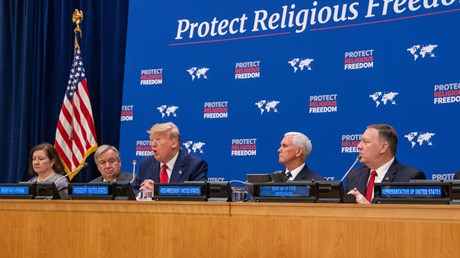The president-elect can integrate it into a pragmatic human rights agenda without repudiating Trump’s legacy.

This week as Poland hosts the third Ministerial to Advance Religious Freedom—the latest in a series of high-profile summits initiated by the Trump administration—many observers are wondering what a Biden presidency will mean for the United States’ promotion of religious freedom abroad.
For the past four years, religious liberty has enjoyed pride of place in President Donald Trump’s domestic and foreign policy agenda. The president and many senior officials routinely addressed the issue—including before the United Nations—and elevated it within executive agencies. At a November 10 press conference, Secretary of State Mike Pompeo said, “I’m especially proud that we’ve made religious freedom a top priority in US foreign policy, for the first time in our nation’s history.”
But there has also been serious concern that all this attention was driven mostly by domestic partisan agendas and was negated by the president’s perceived hostility toward Muslims and his disregard for the norms of liberal democracy. Whatever the impulse and impact, many critics maintain that the Trump administration’s focus on religious freedom has simply been disproportionate—to the detriment of other human rights.
As the team of President-Elect Joe Biden assumes power, they will enter an ongoing contest between two rival conceptions of how religious freedom relates to other human rights. We can call these views “First Freedom” and “Article 18.”
Those in the First Freedom camp speak of religious freedom as the foundational right, highlighting that it is the first freedom mentioned in the First Amendment. Their primary reference point is the legal history ...
from Christianity Today Magazine
via

.gif)

.gif)

.gif)
.gif)
